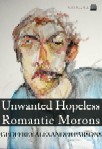
Unwanted Hopeless Romantic Morons
Geoffrey Alexander Parsons
8th House Publishing
$15.88
paper
174pp
978-0980910896
A narrative eventually picks up, though it simply wanders from exploit to exploit. The emphasis is on keeping the story edgy, a tactic that, by itself, cannot sustain interest. The book is further hampered by sloppy editing, and the reader constantly stumbles over phrases with missing or misplaced commas and spelling errors.
Both Tom and Jack remain two-dimensional. Parsons’ reluctance to explore his characters does them injustice, for they have the potential to be intriguing figures. Tom has only brief moments of internal conflict and self-awareness. He wonders at his loyalty to his “racist idiot friend” and is vaguely aware of his own dissatisfaction with his life – but these feelings remain ill-defined. After yelling at his girlfriend for worrying about his excessive drinking, Tom says: “I feel bad. I put the feeling out with beer.” Tom’s refusal to face his demons keeps the book from developing an underlying conflict, let alone an arc or resolution.
In the end, Tom merely recognizes the same purposelessness that has vaguely bothered him since the book began: “You wish you never wasted your time on petty things that brought you pain.”
It is unclear how we are supposed to react to Tom or his story. He is not presented as particularly tragic or comic, nor as hero or anti-hero. The book does not revel in the comedy, beauty, or youthful energy of his antics, nor does it find them horrific or even sympathetic. Abuse, to oneself as well as others, simply exists; it is empty and pathetic. Readers ultimately feel only pity for Tom, which is perhaps what he feels for himself.
mRb





0 Comments